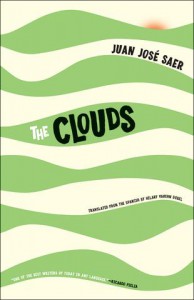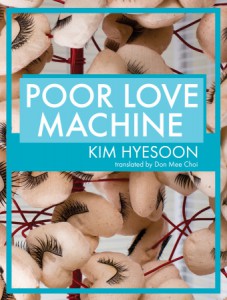The Clouds by Juan José Saer, tr. Hillary Vaughn Dobel, Open Letter Books. Review: Hannah Berk, Digital Editor

The Clouds begins with the destruction of a mental asylum and ends with an arrival at its threshold. Its central journey takes place across a vast expanse of flatlands, every horizon so much the same that progressing and doubling back lose their distinction. This is a novel of contingent geometries. In some respects, it is linear: there is a journey in which a doctor leads a crew of five mental patients, two escort soldiers, and a guide across a desert to a mental hospital. At the same time, it carves layer upon layer into itself. The manuscript we read is a file on a floppy disk being read by one Pinchón Garay in a Paris apartment, haphazardly annotated by the man into whose hands the thing haphazardly fell.
Our narrator is Dr. Real, who works under a psychologist renowned for experimental treatment methods that mostly seem to entail allowing the mad live their lives just like anyone else. He is tasked with leading a group of patients on a long journey to a mental health facility in 1804 Argentina. His charges include a delusional narcissist, a nun convinced that the only way to approach consummate divinity is by consummating as many earthly relationships as possible, two brothers as incapable of communication as they are of silence, and a distraught philosophy student unable to unfurl his fists. Dr. Real promises a scientific account of their ailments at the outset, but the moment their journey begins, we are forced to question whether their responses are so outlandish for their circumstances, or, at their core, much different from our own.
We start wading through a dubious reality in Garay’s apartment, at the novel’s start. M. Soldi, the manuscript’s editor, notes that there is some debate as to whether this text is a memoir or a work of fiction, but is dismissive of the matter: “What else are the Annals, Lavoisier’s Elements of Chemistry, the Napoleonic Code, the crowds and cities, suns and universe, but fiction?” Pressing on through the miles and misadventures, Dr. Real becomes increasingly preoccupied with the distinction between delusion and reality. “There are many who think madness contagious,” he muses. “If so, it is less because those who surround a madman take on those same symptoms in his presence than it is because madness is so corrosive as to alter those who must coexist with it.”
It’s not just the so-called mad corroding the sane, of course. Everyone in the novel is corroded by the reality of Argentinian history—what is the delusional narcissist, who believes himself legitimate master of the universe, but a conquistador? Is the distraught philosophy student out of his mind, or simply heartbroken by bearing witness to the poverty lying at the outskirts of his town? They are corroded, too, by the experience of exile—that expanse of desert and the institution to which these five people, turned away by their towns and families, have been sentenced.
Juan José Saer, an Argentinian born to Syrian immigrants and self-exiled in France much of his life, writes novels obsessed with time, place, memory, and history, never supposing their fixity. Most of his work takes place in the same apocryphal Zona near Santa Fé, and many characters (including Garay and M. Soldi) recur. And yet, book to book, characters and stories complicate and confuse as much as they inform one another. As an addition to the translated Saer canon, The Clouds is significant. As an introduction to that canon, it is delightful. To insist upon reading his novels “in order” would be to impose an outside order upon them.
Hilary Vaughn Dobel is a fine match for Saer’s criss-crossing, back-stepping prose. The English she crafts has a foreign feel. This is not to say she preens sentences into the plumes of an exotic bird. Instead, she guides the language gradually from grounded and precise to something more detached, rambling, and uncertain. By the book’s end, Dr. Real observes that “in the plain’s monotony we had lost the instinct or notion that separates the inner from the outer, as if the language provided in this world had also been uprooted from us and would have spoken itself, doing without the thought and will with which we had learned to employ it on first entering the world.” If one thing is clear in the logic of The Clouds, it is that madness and reality—just like past and present—are one another’s progenitors.
Poor Love Machine by Kim Hyesoon, tr. Don Mee Choi, Action Books. Review by Alexis Almeida, Assistant Editor

“Enter the inside of the sunny morning, and it seems as if the scream can always be heard.” So begins Kim Hyesoon’s Poor Love Machine, which, through its layering of grotesque and mundane imagery, constantly disrupts surfaces and their relationship to concealment, hygiene, spectacle.
This first poem, “Rat,” is one such disruption, moving between different vantage points in its exploration of light. Here, when framed against darkness, light hurts, it pains the speaker with violent, at times horrific confrontation: “The day of the first snowfall, I took an x-ray of my body. Then I asked everyone I met: Have you ever turned on the light inside your intestine? The darkness with a fluid mass moving through it endlessly—is this my essence?” Rather than as a sustained image, the speaker is identified through her association with squalor, darkness, the unseen. And though light is often framed as an assault on these qualities, she does not diminish in its presence, instead assuming various states of affect, including bewilderment, hostility, irreverence: “When the light is switched on inside my darkness, I buzz like a beetle pinned down, bzzz, bzzz, bzzz, bzzz…” It is on this very continuum that Poor Love Machine exists, exploring the way extreme states of dispossession can co-exist with fortitude, the grotesque with tenderness. Kyesoon’s explores an outsider position where voices merge easily with their other, where no identity is fully in possession of itself, as we see in the next poem, “Teardrop”: “Plankton from the inside of the body that fills up the teardrop is also found.”
In an interview with Guernica, Kim Hyesoon says, “Not knowing our bodies have become ‘the paper made of human meat,’ we stuff our bodies and make them a theater where cultural symbols or suppressed symbols play. It is not possible to explain women’s poetry until you sympathize with how women painfully go through the experience of having these tattoos carved on their bodies.” Kim’s relationship to the feminine has always been a subversive one, as she has drawn much attention to the way female personas, especially in early Korean poetry, were the creation of men. According to her, this has also had lasting effects: “When I became a poet, the Korean literary world expected women poets to sing passively of love. Naturally, this was not written anywhere, but this rule existed nonetheless.” In Poor Love Machine, she aims to reinvent the way poetic language, especially within the context of tradition, is used and experienced. Often drawing from a repertoire of classic images (water, hearts, roads, moons, rain, stars, blood), she replaces more conventional ways of experiencing the work, inviting the reader to engage by (hyper)sensorial rather than purely observational means. In “Sunstroke,” for instance, the reader is lulled by familiar, then increasingly insidious imagery,
Get submerged
Get submerged in the blazing sun
Get submerged in the rippling blazing sun
(…)
Let me in, let me in, let me in
the sound is so faint that it pleads with its needle-like hands
until the poem swerves and leaves off with an acutely violent one:
As my eyes open
a flock of crows darts out from my ears
Their beaks poke at my pupils
Or, “The Poem I Wrote With You 2,” which conflates the speaker with the objects she addresses, spreading a thick web of affect between them:
I look into the fishbowl where I used to live, the bowl that returned to me with
its arms folded when I unfolded mine…I looked at it as if I were a live mirror….My body dripped down outside my clothes. I buried the bowl between my knees and wept. The bowl became more slippery. It looked like someone else’s face. Then your face slipped out from it and your eyes evaporated, and, in my hands, your skull crumbled into powder and melted away like dough.
Here, as with many of the poems in the book, the grotesque becomes a way to not only disrupt and undermine the patriarchal culture of the dictatorship Kim grew up under—insisting in the importance of minor, dirty, and horrific material—but also to acknowledge the grotesqueness of the world she was living in. As she has said, “I think that solely through a language of poetry that has schizophrenia can women force the father language down from power.” Poor Love Machine is a constant exercise in dismantling this power and also creating a new mother tongue.
Don Mee Choi’s translator’s note, which gives excellent political and historical context to Hyesoon’s feminism, makes the case for translation as an anti-neocolonial practice:
“Under the miserable dictatorship, we are ‘chunks of freshly grilled flesh inside a womb,’ we are ‘the bloody foam of the flowering field,’… I howl and I shriek and I translate. So the miserable images I translate are the same as the letters I send into the miserable world. I come to translation, the language of echoing, the language of howling, under the U.S. imperialism. Translation = Antithingification.”
Antithingification, a reference to her earlier mention of Aimé Césaire’s “colonization = ‘thingification,’” seems to perfectly describe not only the project of translating a subversive book, but also Kim’s subversive project of using language’s spectacular qualities for her own purposes. Although the sections are not so easily distinguishable, the second half of Poor Love Machine emphasizes cityscapes, particularly of Seoul, and the anti-colonial project of the book becomes apparent against this particular backdrop. Don Mee Choi mentions “the [Sampoong] department store dripping with saliva,” a direct reference to the department store that “collapsed in 1995, killing 502 people—a neoliberal-terror-related building collapse,” and there are many references to these particular terrors. Perhaps my favorite moment is from a poem called “Poor Love Machines Trapped in Rain,” which describes, in painful detail, the futile and necessary project of capturing such terror with a many-sided gaze: “The crushed body gets erased / then is crushed again / the way a painter shakes a brush / and keeps drawing thin lines / in order to keep lifting up / the body about to be crushed.”
Algaravias: Echo Chamber by Waly Salomão, tr. Maryam Monalisa Gharavi, Ugly Duckling Presse. Review by Poupeh Missaghi, Editor-at-large, Iran

The book starts with a word definition:
“Algarabia: from the Arabic al-garb, the West; algarabia, where the sun sets, occidental thing, people who live facing westward, language of the Arabs that lived facing westward: And as that language of the Arabs was considered a corrupted form of Arabic, little understood by the Spaniards, from here algarabia began figuratively to pass for something written or said in a way that one does not understand, and the clamor of various people who by all speaking at the same time, cannot be understood. – Others say that it came from alarabiya, the Arabic language. Algarabia is also the name of a plant, and it appears that it was given because of the messiness of its branches, alluding to the most coming meaning of the voice of algarabia (Academia Española).” (7)
This is significant; a good introduction to what comes next in Algaravias: Echo Chamber, Waly Salomão’s book that won Brazil’s highest literary prize, the Prêmio Jabuti. The poems in the collection might have a semblance of clamor and messiness but they actually form a modern complex whole. They thread together and mirror many aspects of our human experience, such as the human fate, knowledge, creation, language, place, time, displacement, belonging, etc. delving into what, in all this, is understood or, for one reason or another, misunderstood or not understood at all.
From “THE TRUE STRUCTURE / OF NATURE,” (9) to a “locked poem” (13) to “jet turbines” and “scanners” (21) to “Dr. Martens” shoes to a “sexualized mother / joyful mother” (33) to “the burning of archives” (39) to a “déjà vu sensation” (57) to “gradual loss of hair” (71) to “Narcissus,” (85) to Paul Valéry, John Ashbery, and Wallace Stevens, and Sartre, they all sit together in the book to dig deep into many layers of our being in the world.
Salomão (1943-2003) was born in Jequié, Bahia, Brazil to a Syrian immigrant father and a Brazilian mother. Translator Maryam Monalisa Gharavi was born in Iran and became an immigrant herself at the age of seven. In an interview with Mirene Arsanios, Gharavi speaks about her first encounter with Salomão’s work when she lived in Brazil as a student:
“I was instantly drawn to his poetry, and ended up tracing his footsteps all over the bookstores and public squares of Rio de Janeiro where he would give huge outdoor readings. Poetry quite literally stopped traffic at the time.
There was something vibrant in Salomão’s work that drew people in, even though he was also accused of writing too intellectually.”
It is with this intellectual composed voice that is meanwhile intimate and vulnerable that Salomão contemplates the natural and the unnatural world. He deals, in Gharavi’s words, with “a conjugated and multivalent reality.” And in the process, he reveals to us our distances and our ties, our achievements and our failures, our gains and our losses.
In the “Jet-Lagged Poem” (21-29), he writes,
“Writing is to avenge loss.
Although the material has dissolved completely,
like melted cheese.
Writing is to avenge?
From loss?
Loss?
Notwithstanding? In good standing.”[1]
Even though in Salomão’s world “all the full things tear each other to pieces / or are lacerated” (“Guarding the Hollow of Time” 75), “the days follow each other and settled is the intention / to convert all prohibited things and rust / into pieces of paradise. Or vice-versa” (“Open Letter to John Ashbery” 41).
[1] You can read the complete “Jet-lagged Poem” in Asymptote.
A few other poems from the book can also be found at The Brooklyn Rail.
*****
Read more from New in Translation:

